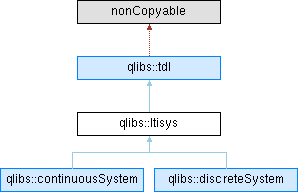|
| virtual | ~ltisys () |
| |
| | ltisys ()=default |
| |
| real_t | excite (real_t u) noexcept |
| | Drives the LTI system recursively using the provided input sample.
|
| |
| real_t | operator() (const real_t u) |
| | Drives the LTI system recursively using the provided input sample.
|
| |
| virtual bool | isInitialized (void) const noexcept=0 |
| | Check if the LTI system is initialized.
|
| |
| | operator bool () const noexcept |
| | Check if the LTI system is initialized.
|
| |
| virtual bool | setInitStates (const real_t *xi=nullptr)=0 |
| | Set the initial states for the given system.
|
| |
| ltisysType | getType (void) const |
| | Get the LTI system type.
|
| |
| bool | setDelay (real_t *const w, const size_t nD, const real_t initVal=0.0_re) noexcept |
| | Set the input delay for LTI system.
|
| |
| bool | setSaturation (const real_t minV, const real_t maxV) noexcept |
| | Setup the output saturation for the LTI system.
|
| |
| virtual | ~tdl () noexcept=default |
| |
| | tdl ()=default |
| |
| | tdl (real_t *const area, const size_t n, const real_t initVal=0.0_re) noexcept |
| | Constructor for the Tapped Delay Line (TDL) instance.
|
| |
| template<size_t numberOfDelays> |
| | tdl (real_t(&area)[numberOfDelays], const real_t initVal=0.0_re) noexcept |
| | Constructor for the Tapped Delay Line (TDL) instance.
|
| |
| void | setup (real_t *const area, const size_t n, const real_t initVal=0.0_re) noexcept |
| | Setup and initialize a Tapped Delay Line (TDL) instance by setting the default optimal parameters.
|
| |
| template<size_t numberOfDelays> |
| void | setup (real_t(&area)[numberOfDelays], const real_t initVal=0.0_re) noexcept |
| | Setup and initialize a Tapped Delay Line (TDL) instance by setting the default optimal parameters.
|
| |
| void | flush (const real_t initVal=0.0_re) noexcept |
| | Clears all delays from the TDL and sets them to the specified value.
|
| |
| real_t | getOldest (void) const noexcept |
| | Get the oldest sample from the TDL x(k-n)
|
| |
| real_t | getRecent (void) const noexcept |
| | Get the most recent sample from the TDL x(k)
|
| |
| real_t | getAtIndex (const size_t i) const noexcept |
| | Get the specified delayed sample from the TDL x(k-i)
|
| |
| void | insertSample (const real_t sample) noexcept |
| | Insert a new sample to the TDL removing the oldest sample.
|
| |
| real_t | operator[] (int index) noexcept |
| | Get the specified delayed sample from the TDL x(k-i)
|
| |
| void | operator() (const real_t sample) noexcept |
| | Insert a new sample to the TDL removing the oldest sample.
|
| |
| bool | isInitialized (void) const noexcept |
| | Check if the TDL has been initialized.
|
| |
| | operator bool () const noexcept |
| | Check if the TDL has been initialized.
|
| |



 Public Member Functions inherited from qlibs::tdl
Public Member Functions inherited from qlibs::tdl